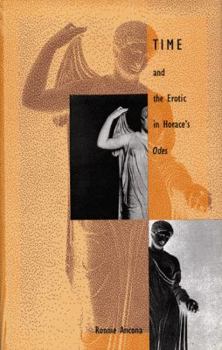Time and the Erotic in Horace's Odes
In Horace's Odes love cannot last. Is the poet unromantic, as some critics claim? Is he merely realistic? Or is he, as Ronnie Ancona contends, relating the erotic to time in a more complex and interesting way than either of these positions allows? Rejecting both the notion that Horace fails as a love poet because he undermines the romantic ideal that love conquers time and the notion that he succeeds becauses he eschews illusions about love's ability to endure, this book challenges the assumption that temporality must inevitably pose a threat to the erotic. The author argues that temporality, understood as the contingency the male poet/lover wants to but cannot control, explains why love "fails" in Horace's Odes . Drawing on contemporary theory, including recent work in feminist criticism, Ancona provides close readings of fourteen odes, which are presented in English translation as well as in Latin. Through a discussion of the poet's use of various temporal devices--the temporal adverb, seasonal imagery, and the lover or beloved's own temporality--she shows how Horace makes time dominate the erotic context and, further, how the version of love that appears in his poems is characterized by the lover's desire to control the beloved. The romantic ideal of a timeless love, apparently rejected by the poet, emerges here instead as an underlying element of the poet's portrayal of the erotic. In a critique of the predominant modes of recent Horatian scholarship on the love odes, Ancona offers an alternative view that takes into account the male gender of the lover and its effect on the structure of desire in the poems. By doing so, she advances a broader project in recent classical studies that aims to include discussion of features of classical literature, such as sexuality and gender, which have previously escaped critical attention. Addressing aspects of Horace as a love poet--especially the dynamics of gender relations--that critics have tended to ignore, this book articulates his version of love as something not to be championed or condemned but rather to be seen as challengingly problematic. Of primary interest to classicists, it will also engage the attention of scholars and teachers in the humanities with specializations in gender, sexuality, lyric poetry, or feminist theory.
Format:Hardcover
Language:English
ISBN:0822314762
ISBN13:9780822314769
Release Date:October 1994
Publisher:Duke University Press
Length:200 Pages
Weight:1.10 lbs.
Dimensions:0.8" x 5.9" x 9.1"
Related Subjects
PoetryCustomer Reviews
0 rating





